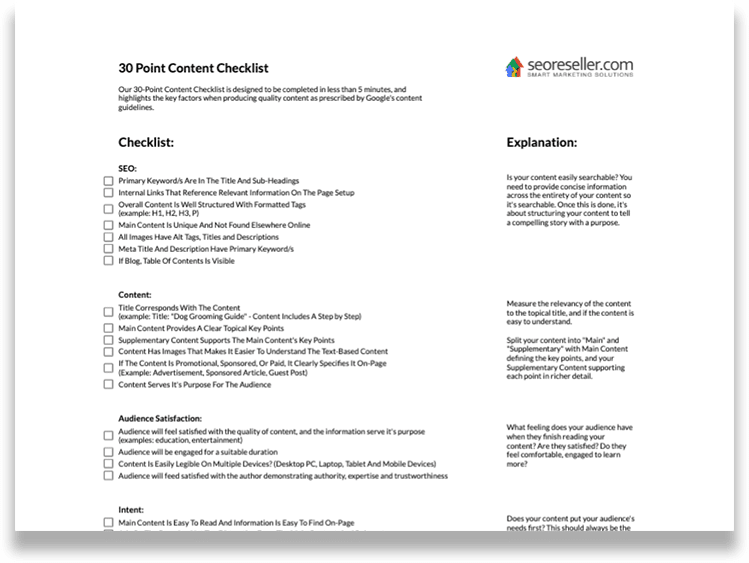Have you ever sat down to write your next blog post and wondered, “How long should a blog be?”
You’re not alone. In fact, some of the biggest names in the content marketing game have conducted massive studies to answer this one question.
What have they discovered?
Read on to learn everything there is to know about:
- The best length for a blog post
- The benefits of lengthy blog posts; and
- How to write blog posts for SEO
Why Does Blog Word Count Matter for SEO?
It’s easy to get caught up in the concerns that your blogs are reading too short — or maybe even too long — when you don’t see your page ranking on a Google search.
While the length of your blog post does matter, it might surprise you to learn that it doesn’t matter nearly as much as the content within your post.
What do we mean?
Google has a designated team of highly-trained quality raters who comb websites looking for the pages that most closely match the intent of the search.
Google is looking for comprehensive content, more than anything, which is why websites with blog posts that answer the users’ questions will rank higher than a shorter post that doesn’t add as much value.
But, high word count does not always mean the content is comprehensive.
Be warned that Google’s algorithms and quality raters are very good at spotting blogs where the keywords seem “stuffed” into the content or where the content has a lot of “fluff” to make it seem longer.
At the end of the day, word count does matter, but you’re better off with a 1,000-word post that comprehensively addresses the intent of the keyword, than a 3,000-word post with a ton of info that isn’t related to the topic.
How Long Should a Blog Be for SEO?
So, what’s the best length for a blog post?
There’s no right or wrong answer here.
Remember, comprehensive posts will outrank longer posts that steer off-topic or seem to be written just for length.
When Backlinko analyzed 912 million blog posts, they found that content with a word count of 1000-2000 words generated 56.1% more social shares.
But, the same study indicated that long-form content gets 77.2% more links than shorter articles, which tells us that a longer post has value in different ways.
SerpIQ conducted a different study and found that blog posts with an average word count of almost 2,500 words were more likely to rank in the top 10 search results.
So, how long should a blog be? It depends on your end goal.
Keep reading to learn how to optimize your word count to suit your purposes.
3 Benefits of Lengthy Blog Posts
#1: Readers Spend More Time On the Page
The longer your content, the longer search engine users will stay on your page.
Not only does longer content keep users on your page, but it also encourages them to explore more of your content.
And while attention spans are getting shorter, blog word count is actually getting higher.
From 2014 to 2018 the average length of a blog increased by 42% and it was found that these longer blog posts generated 9x more leads.
Readers are not always looking for quick answers, and by creating longer, more comprehensive blog posts, you’ll not only increase both the amount of time spent on your page, but also your online credibility.
#2: Increases Social Shareability
Ranking on page one of a Google search is obviously going to get your blog posts noticed, but just as importantly, you want your readers to share your content on social media.
Several studies have been done with regards to how the average blog post length affects social shares. Here are the findings from QuickSprout:
- Blog posts that were over 1,500 words received 68.1% more tweets than those that were under 1,500 words
- Blog posts that were over 1,500 words received 22.6% more Facebook likes than those that were under 1,500 words
We already know that Google prefers content-rich pages, but it turns out that the social web does too.
Every minute, 54,000 links are shared on Facebook and when we look at the psychology behind what people share and why, it’s not hard to believe.
Every single post shared can easily fall into one of the five basic needs as outlined by Maslow’s Hierarchy of Needs.
So, the next time you sit down to write a blog post, remember that word count matters, but so does the nature of your content.
You want your content to stand out and speak to the needs of the reader, but you should also ask your readers to share your post on their social media.
#3: Increases Your Chances of a Higher SERP Ranking
Short and sweet serves a purpose, and we’re not saying that a 300-word blog post won’t hit the mark or rank on Google, but ultimately you should still aim for 1,000+ words if you want to see your page in the SERP.
Google’s most recent update lists “page experience” as one of the dominating factors in how well a page will rank and they’re specifically looking for pages that engage readers with relevant and comprehensive content — which ultimately means longer blog posts.
As you can see from the images below, our search for the keyword “how to teach my child to read” shows us that the average word count for the top three ranking sites on Google is 2,264 words.
Ranked #1 on Google:
Ranked #2 on Google:
Ranked #3 on Google:
SEOReseller is a team of highly qualified SEO specialists who know exactly how to get your website ranking higher in SERPs.
Visit our website to learn more about our content marketing and SEO strategy services.
SEO Blog Length FAQs
What Is the Average Blog Post Length?
With blog posts ranging from about 300 to 5,500 words, the average blog post length varies depending on how, and by whom, the study was conducted.
No one knows exactly what the average blog length is, but as we proved from the quick search above, longer-form blog posts tend to rank higher in Google.
So, if that’s your goal, then it’s probably best to aim for 1,500-2,500 words of quality content.
How Long Are Blog Posts Usually?
There is no correct answer to this question, but what we do know is that readers are more likely to stay on the page if the content is valuable and averages seven minutes to read (approximately 1,600 words), according to a study done by Medium.
Keep in mind, some posts that average seven minutes to read aren’t all content-rich but may contain graphics, video, or other media which could bring the word count down substantially.
Ideally, anything you post should be relevant and interesting to the reader as Google also considers bounce rate when ranking pages.
How Many Words Should a Good Blog Post Have?
Blog posts should only be as long as they need to be to get the message across.
However, adding valuable content will increase your chances of ranking on Google.
Consider these five steps:
- Give examples
- Use quotes
- Find additional sources
- Add an introduction and conclusion
- Consider different viewpoints
A good blog post isn’t focused as much on word count as it is on satisfying the intent of the keyword search.
How Long Should My First Blog Post Be?
Don’t worry how long your first blog post should be, instead, focus on what it’s going to be about.
Your first blog should tell your readers:
- Who you are
- Why you’ll be blogging
- What you’ll blog about
- Who the blog is for
- Your blogging goals
- How often you’ll post
Build up some excitement by giving your audience expectations and something to look forward to.
You can even encourage feedback by adding a comments section so that your readers can engage.
Can a Blog Post Be Too Long?
Longer posts tend to do better in Google rankings — the sweet spot seems to hover around the 2,500-word mark — but that doesn’t mean that a 5,000-word blog post is too long.
Comprehensive content that adds value to your reader should be your main goal.
Now, as you’ll read below, there are some cases where shorter actually is better. If your topic doesn’t need pages and pages of explanation, then it’s quite likely your reader will bounce if they find they’re drowning in unwanted or unnecessary information.
Try to keep these benchmark word counts in mind the next time you think you need to “fluff up” your content:
- 300 to 500 words: Short posts are a fantastic way to get a discussion going, or for quick engagement. While you won’t get as many shares or you may not rank as highly, you’ll be able to quickly get your message across to your existing audience.
- 600 to 800 words: Smaller blog posts are great for sharing quick informational tidbits that your audience will appreciate and likely share on social media. While you won’t get noticed by Google, you will appeal to readers looking for a fast read, especially if the content is engaging and interesting.
- 900 to 1400 words: A great way to start adding references and slowly building your SEO, these medium-length posts do have the potential of ranking on the first page of Google. Just remember, keep your post journalistic in style, and back your findings with studies and credible data.
- 1500 to 2500 words: This is where you’ll get the attention of Google and other search engines. If your goal is to increase your organic site traffic, then aim for this length or even slightly longer.
Variety is the spice of life — or so they say — so, why not mix it up? There is no hard rule as to what length every blog post should be.
Keep in mind, that it only takes one really great blog to get your reader to explore your website even more.
SEO Best Practices: What Is the Minimum Blog Post Length?
Now, of course, you’re probably wondering, “What is the minimum blog post length?” SEO best practices should come into play here if your goal is to increase your organic traffic and rank more frequently on Google.
So, how long should blogs be for SEO?
According to the research, at minimum, a good length for a blog post is 300 words.
Now, remember that a blog post this short likely won’t rank on Google, but any less, and your site could be flagged for “low word count” on a site audit.
If you’re ready to take your content marketing strategy to the next level, SEOReseller can help.
We have years of experience in SEO best practices and can implement a strategy that will deliver the results you’re looking for.
Does the Ideal Length of a Blog Post Depend on the Type of Post?
While you shouldn’t get too caught up in the perfect word count, it can be said that there is a “formula” of sorts when it comes to the type of post you are creating.
For example, you wouldn’t typically drop 5,000 words into a “what is” blog post because answering any question should never really need that many words.
But then, you wouldn’t want to create your pillar post and stop at 1,000 words.
Below, we’ve outlined what we consider to be the ideal word count for each type of post you might be creating.
“How-To” Blogs
How-to pages are probably the most dynamic in terms of word count because teaching your reader how to do something simple doesn’t require an essay, but a more complicated process could definitely get up there in word count.
For example, we Googled “how to get grass stains out of jeans” and the #1 ranked page contains just over 1,300 words, whereas the #1 ranked page for the keyword “how to rank first on Google” is just shy of 3,100 words.
Since grass stains are relatively easy to remove, the writer laid out six ways to get the job done, complete with step-by-step images throughout the content.
So, even though the word count is relatively low based on the average word count for highly ranked pages, anything more would have been unnecessary — and Google knows it.
“How to rank first on Google”, on the other hand, is a much more complicated process with many factors involved. The writer knew that to get noticed, the information needed to be comprehensive, and there needed to be a lot of it.
If you’re planning to write a how-to page, here are some tips to get you started:
- Be as clear as possible when giving step-by-step directions
- Break up your content to make it easier to read
- Add section headers so that the reader can easily scroll and find the step they need
- Bulleted or numbered lists enhance readability
- Avoid adding long stories or unnecessary content
- Add helpful graphics or videos
Pillar Pages
Pillar pages are basically content beasts. A pillar page will act as an all-encompassing guide to the topic you’re covering.
Most writers should aim for about 4,000 words for a pillar piece, like the post we found for information about building a free stock photo library.
But, it’s also not unusual to come across posts like the one we found about building an Amazon FBA business that contains more than 13,100 words.
That may seem like an intimidating figure, but pillar pages are so valuable because they act as a parent page for a group of shorter pages relating to your topic. So, they really do need to be as comprehensive as possible.
Here are some tips to get you started on your pillar page:
- Aim for 4,000+ words
- Link to all of your related pages
- Cite reliable and reputable sources
- Be thorough in your research
- Use headers and break up your text for readability
- Be consistent with your brand voice
- Cover the intent of the search as comprehensively as possible
- Include meaningful graphics or videos
Listicles
As fun to write as they are to say, listicles are a great first post for aspiring bloggers.
Aim for a blog post word count of about 2,000 to 2,500 words and remember to include plenty of …
- Examples
- Facts
- Quotes; and
- Tips
… around the topic you’re writing about.
Look at the two posts below and think of it this way, if you wanted to see a list of tips on how to save money, wouldn’t you choose a comprehensive list of 54 facts over a much shorter one containing only 10 facts?
“What-Is” Blogs
“What-is” posts are another easy and approachable starting point for new bloggers as well as a quick and effective way to add variety to your content.
We analyzed the top 3 pages for the keyword, “what is bitcoin” and what we found is that all three pages varied greatly in word count, with the lowest containing 383 words and the average of the three rounding out at 1,896 words.
Typically, though, you can get away with content in between 1,300 to 1,700 words and stand a chance at ranking for your keyword.
If you’re looking for a way to beef up your content, you can do so easily with “what-is” posts by adding headers such as:
- How does bitcoin work?
- Is bitcoin a good investment?
- Who uses bitcoin?
- Why do people want bitcoins?
- How are new bitcoins created?
- Etc.
How to Write High Quality, Comprehensive Blog Posts for SEO
Where SEO is concerned, content is still king.
You can spend a lot of time worrying about the best length for a blog post, but it simply won’t matter if your content:
- Doesn’t match the search intent
- Isn’t readable
- Doesn’t utilized headers and subheaders
- Isn’t original; and
- Doesn’t capture the reader’s attention
Google isn’t looking solely at word count — more than anything, crawlers are looking for quality content.
Follow these tips to creating rankable content for SEO:
- Look at what your competition is doing and aim to do better.
- Consider what your audience is looking for and match the intent of their search.
- Think about writing comprehensive content, rather than “long” content.
- Include captivating title tags and meta description to attract your audience’s attention.
- Break up your writing into shorter paragraphs, bullets, and numbered lists.
- Insert high-authority external links to back your claims.
- Include internal links to related content on your site.
- Naturally implement keywords without overusing or “stuffing” them into the content
- Incorporate multimedia like charts, images, videos, and more.
Keep this in mind: If you don’t think your content is adding any value to the reader, then you’re likely doing it wrong.
Remember: Word Count Isn’t Everything
Finally, instead of worrying, “How long should a blog post be?”, shift your focus to creating quality, comprehensive content that your readers will love.
Know your audience and aim to satisfy their needs and you’re more likely to rank than if you focused completely on getting your word count high.
Optimize Your Blogs for SEO With SEOReseller
The team at SEOReseller team can help you create blog posts that not only reach target word counts but, more importantly, use SEO best practices that will get your pages ranked on Google.
Our blog post strategies will add real value to your target audience.
Contact us today for a free, comprehensive website audit and to get started on your content strategy.



